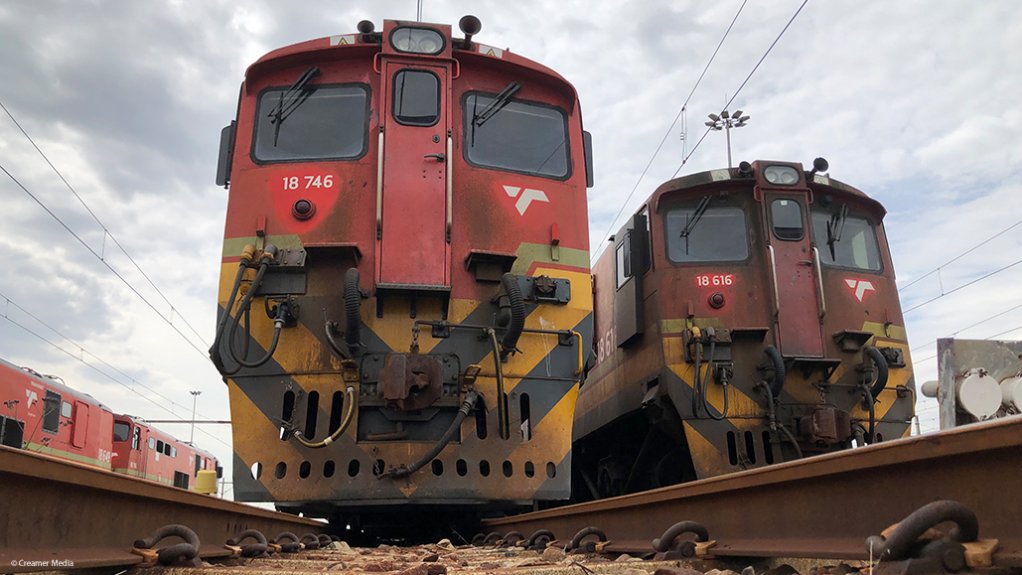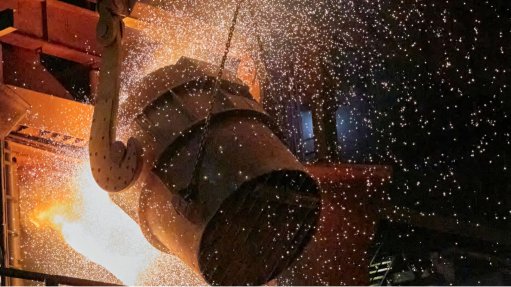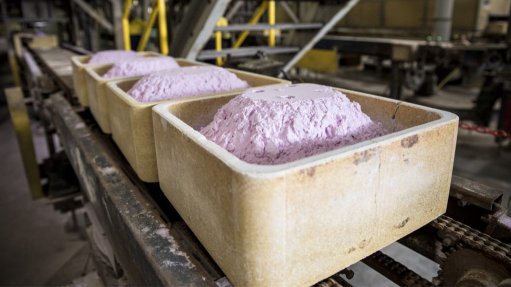Private train operators could access Transnet's rail network by April 2025, says business development exec
State-owned Transnet Group chief business development officer Yolisa Kani has said calls for applications for private train operators wanting to access the freight rail network are likely to open early next year.
Reform of rail legislation means that it is likely that private train operators will be able to access the rail network by April 2025, she noted during a stakeholder engagement event hosted by Transnet alongside the South African Chamber of Commerce and Industry, on September 5.
Kani pointed out that the decline in Transnet's rail volumes had been arrested, as the freight logistics group and its partners continue to work on the recovery and reform of South Africa's rail logistics.
"There is an addressable market share out there, but the challenges of insufficient rolling stock and unsuitable infrastructure mean that we are unable to capture this market, which resulted in lots of rail-friendly freight moving onto road," she said.
Transnet, which aims to recover within 18 months to three years and reform itself within five years, is investing for growth across three main pillars, with the first being fixing and optimising the business, which is a technology-driven plan.
"Transnet [Freght Rail (TFR)] achieved 152-million tonnes in the past year against a target of 155-million tonnes. This may represent only a marginal increase in rail volumes, but represents an arrest of the decline," Kani said.
The second pillar of its investment strategy is to invest in transformation to change the way it operates. Transnet is separating its TFR business into two separate business units, with one an infrastructure management company and the other a freight services operator.
TFR is Transnet's largest business unit and provided R39.1-billion to the group's revenue during the past financial year.
Access to the rail network for public and private operators will be regulated by a Transport Economic Regulator, she noted.
"Transnet welcomes competition on the rail network because we cannot do this alone. There is an addressable market share that can more efficiently be moved by rail, but private sector companies can help to close any gaps that we cannot efficiently close," said Transnet Group COO Solly Letsoalo.
Recovery of the national rail network, reform of Transnet and achievement of the National Logistics Crisis Committee objectives in rail should support economic growth in South Africa of 0.5% to 2.2%.
The third pillar of Transnet's investment strategy is on expansion to enable the South African economy to grow, including by developing new infrastructure, such as a liquefied natural gas terminal, as well as through private-sector partnerships, such as the new container terminal being built in Richards Bay.
However, Transnet will require R50-billion over five years to address the maintenance backlog of the rail network. This cannot be done solely during its yearly maintenance shutdowns, but it will manage the process in partnership with its clients, noted Kani.
LOGISTICS EFFICIENCY
"We are tasked with lowering the cost of doing business in South Africa, enabling economic growth and ensuring security of supply by providing appropriate port, rail and pipelines infrastructure, as well as the cost-effective and efficient operation of these according to acceptable benchmark standards," said Letsoalo.
"Our freight should be competitive with the rest of the world," he added.
Transnet has a key role to play in helping to improve the competitiveness of the South African freight system and is working with government and private sector partners to ensure that supply chains are competitive and that the country is competitive.
"We have also been tasked with growing rail and its share of the market to reduce the carbon footprint of the freight system, including by reducing the number of trucks transporting bulk commodities, which should be on rail," he said.
Transnet's primary role is to help create an efficient and cost-effective logistics system in South Africa. This is critically important because South Africa is an end of world destination, emphasised Transnet Commercial Strategy executive manager Monde Mqoli.
"For us to be competitive, we need to run an efficient and optimised intermodal system for transport and logistics," he said.
The development of South Africa's economy from mining has led to most of its productive regions being inland, and a large part of the country's GDP depends on transportation, including agriculture, mining and bulk commodities.
Additionally, its high logistics costs are linked to modal misalignments, with the country relying on trucks owing to poor rail services, which drives up the costs. One coal train can transport a similar load as 400 coal trucks, and the modal misalignments multiply transport costs, he illustrated.
"As we work to recover the business, we must keep in our minds that the aim is to improve the performance of the rail network to enable the economy to become more competitive over time," Mqoli said.
It is important for Transnet to reposition the business and correct shortcomings so that it can deploy more capital, do more maintenance, renew equipment and replace the obsolescence in the business.
"It is important for us to deploy capital more effectively across the business to generate the business returns that we need," he added.
Logistics is a derived-demand business. However, there are addressable volumes, including from mining companies that have stockpiled commodities and/or reduced production.
"A compound effect can be achieved, if we can reform the business correctly."
Specifically, Transnet needs to strive for excellence in operational execution, he emphasised.
"In the absence of the ability to procure new assets in the short- to medium-term, we have to effectively use what we have in terms of our equipment and our people to deliver value to our customers and the economy," said Mqoli.
The first six months of Transnet's 18-month recovery plan resulted in an uptick in rail volumes and a stabilisation of TFR rail volumes.
"We have had teething problems, as well as crime and vandalism challenges, but we are getting some traction from our recovery programme," he said.
While Transnet missed its rail performance improvement target, including in port container terminals, there were some positive offshoots of the programme, including that Transnet's north corridor and container corridor continue to outperform during the current year, he noted.
Article Enquiry
Email Article
Save Article
Feedback
To advertise email advertising@creamermedia.co.za or click here
Press Office
Announcements
What's On
Subscribe to improve your user experience...
Option 1 (equivalent of R125 a month):
Receive a weekly copy of Creamer Media's Engineering News & Mining Weekly magazine
(print copy for those in South Africa and e-magazine for those outside of South Africa)
Receive daily email newsletters
Access to full search results
Access archive of magazine back copies
Access to Projects in Progress
Access to ONE Research Report of your choice in PDF format
Option 2 (equivalent of R375 a month):
All benefits from Option 1
PLUS
Access to Creamer Media's Research Channel Africa for ALL Research Reports, in PDF format, on various industrial and mining sectors
including Electricity; Water; Energy Transition; Hydrogen; Roads, Rail and Ports; Coal; Gold; Platinum; Battery Metals; etc.
Already a subscriber?
Forgotten your password?
Receive weekly copy of Creamer Media's Engineering News & Mining Weekly magazine (print copy for those in South Africa and e-magazine for those outside of South Africa)
➕
Recieve daily email newsletters
➕
Access to full search results
➕
Access archive of magazine back copies
➕
Access to Projects in Progress
➕
Access to ONE Research Report of your choice in PDF format
RESEARCH CHANNEL AFRICA
R4500 (equivalent of R375 a month)
SUBSCRIBEAll benefits from Option 1
➕
Access to Creamer Media's Research Channel Africa for ALL Research Reports on various industrial and mining sectors, in PDF format, including on:
Electricity
➕
Water
➕
Energy Transition
➕
Hydrogen
➕
Roads, Rail and Ports
➕
Coal
➕
Gold
➕
Platinum
➕
Battery Metals
➕
etc.
Receive all benefits from Option 1 or Option 2 delivered to numerous people at your company
➕
Multiple User names and Passwords for simultaneous log-ins
➕
Intranet integration access to all in your organisation





















